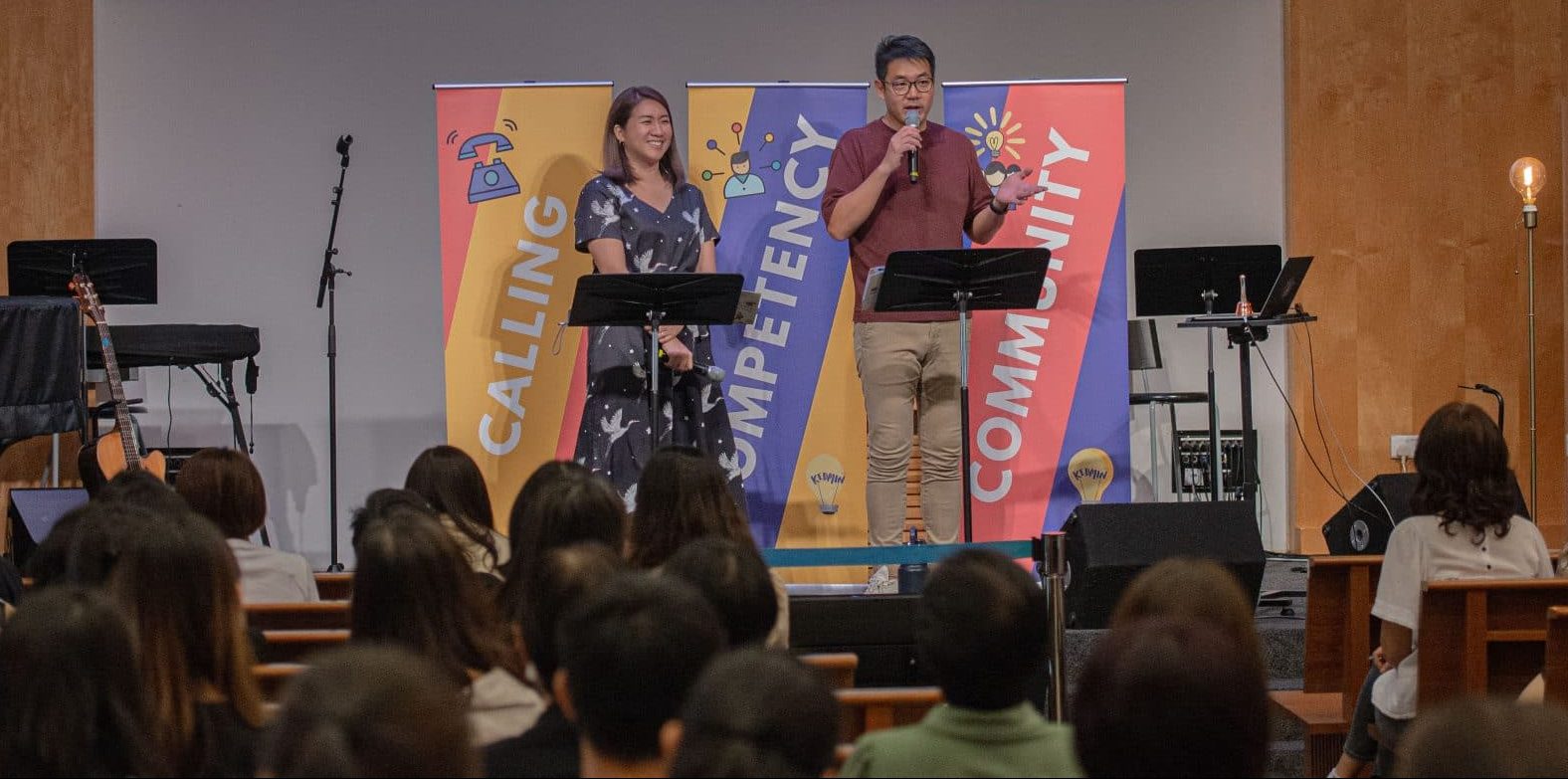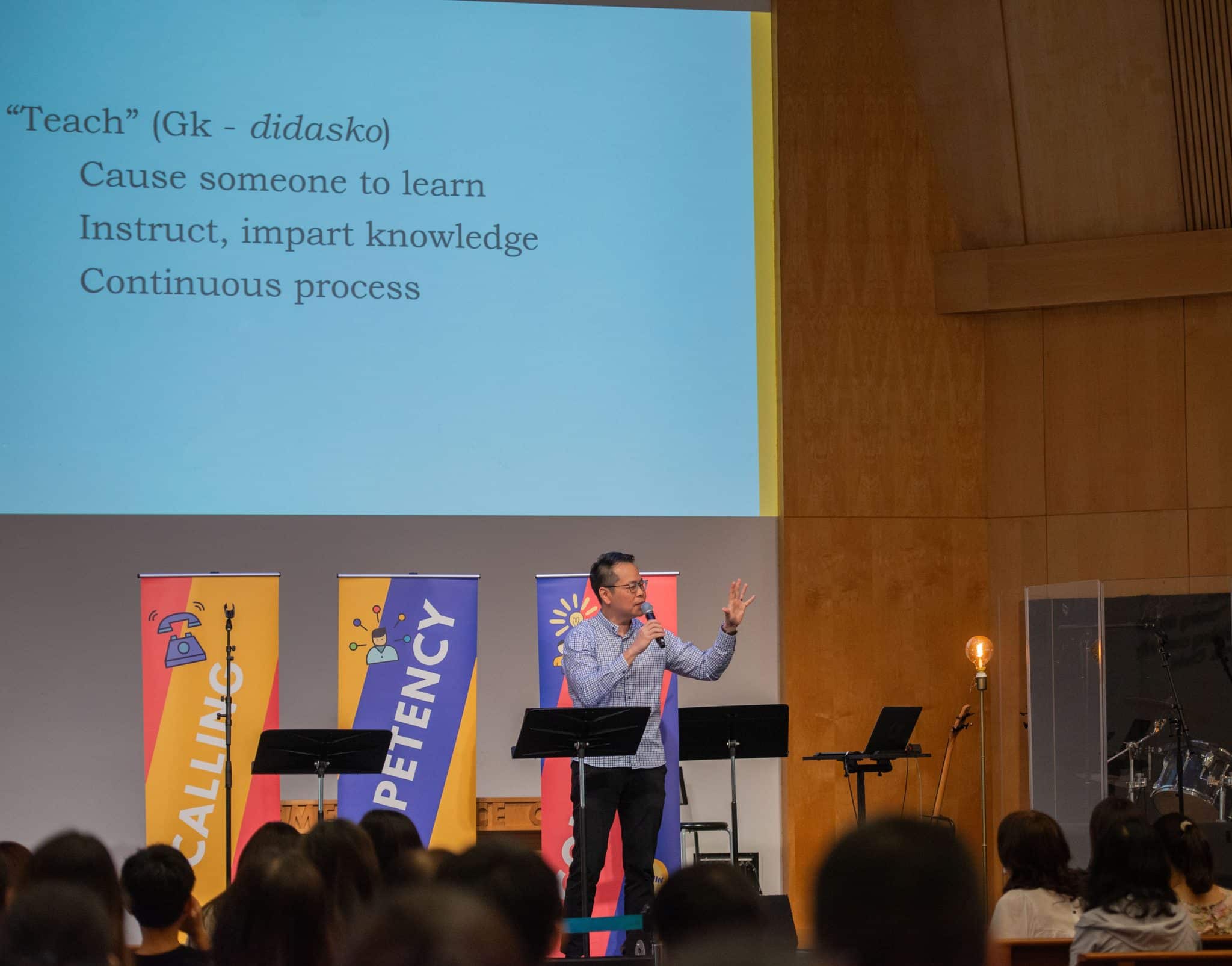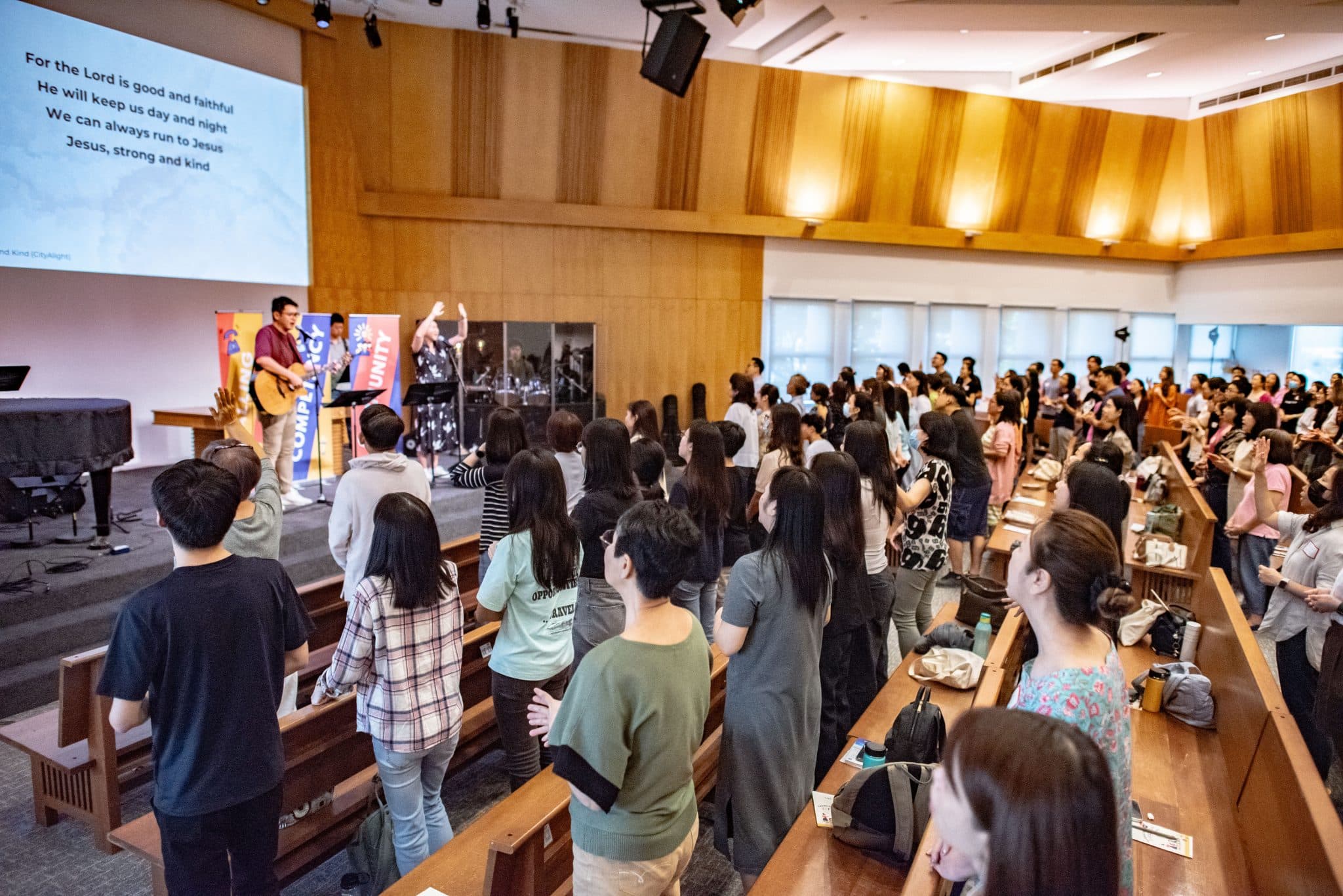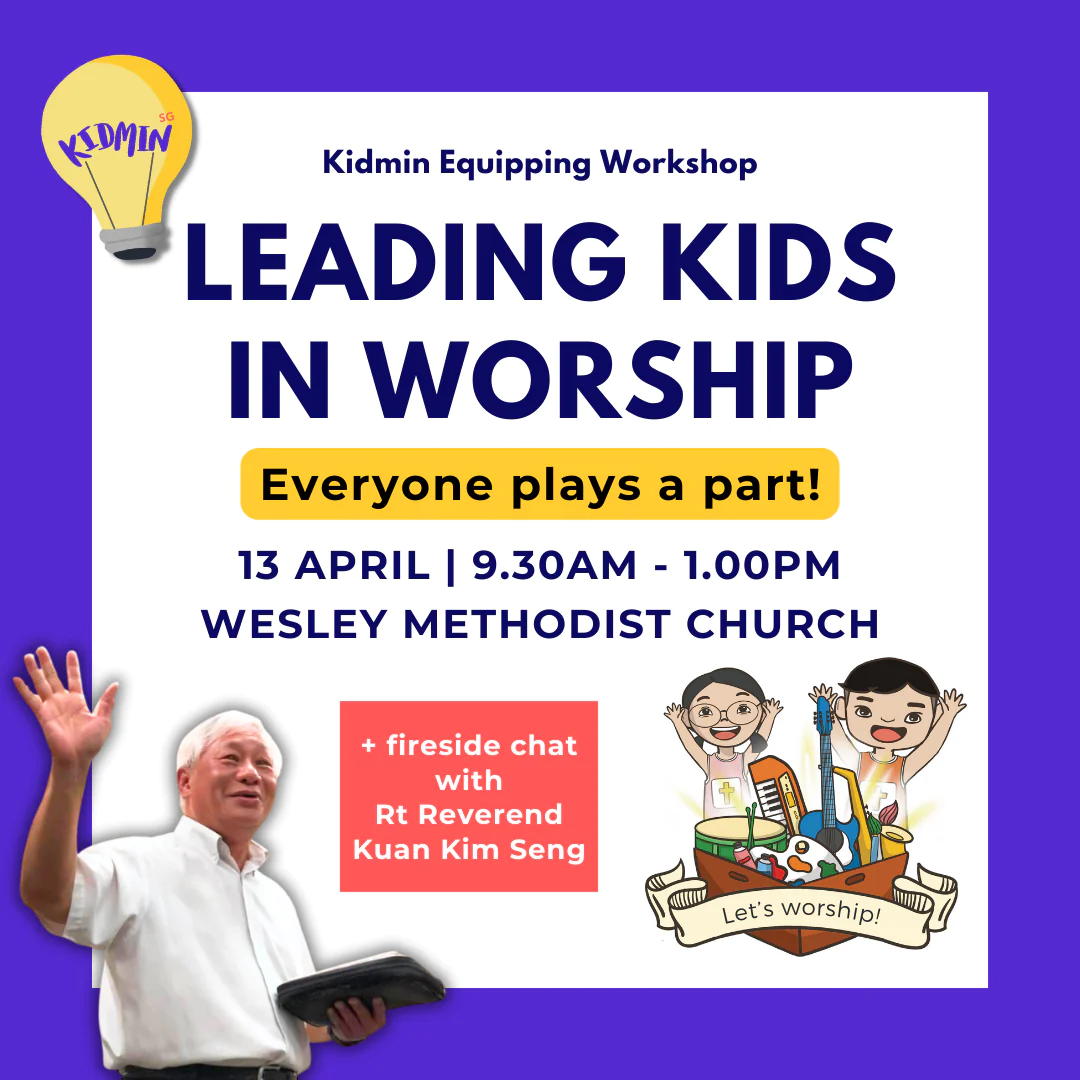Teaching children in church? Kidmin SG wants you to have the 3Cs
by Gracia Chiang // March 8, 2024, 10:50 am

Co-founders Elvin and Esther Foong have a burden for encouraging and equipping kids' ministry leaders and volunteers. All photos courtesy of Kidmin SG/Joshua Khoo.
“These days it’s not easy being a teacher. But this call of being a teacher is really important,” declared Rev Raymond Fong, Pastor-in-Charge of Wesley Methodist Church.
Speaking at Kidmin SG‘s first workshop of the year on January 27, he was addressing almost 250 attendees representing some 30 churches who were gathered to learn how to do children’s ministry effectively.
Started in late 2023, Kidmin SG is helmed by husband-and-wife team Elvin and Esther Foong, who share a desire of helping kids’ ministry practitioners to discover and deepen their calling, build their competencies and belong to a community.
Opening with God’s Word, Pastor Raymond’s message – titled The Call of a ‘Cher – set out to address the first C: calling.
“Those of you who have been in children’s ministry for a while will know it’s actually a very, very tiring job. You spend Sundays or weekends loving and caring, and it drains so much out of you,” he empathised.
“It’s important to come back to calling because it’s calling that will sustain you; it’s calling that will keep you going in the most troubling, most difficult times.”
Teaching was at the heart of the ministry of Jesus.
Pointing the audience back to the teacher of all teachers, Pastor Raymond asked: “Do you know that of all the 90 references that Jesus was directly addressed (in the gospels), He was not mostly known as ‘Messiah’ or ‘Lord’?
“He was mostly known as ‘Teacher’. Teaching was at the heart of the ministry of Jesus. At the heart of it all, He was a teacher.”
Referencing passages from Matthew 7:28-29, John 3:2 and John 13:13-17, he added: “Jesus didn’t just come to die for us… He came to teach us how to live.
“Whether you know it or not, every Sunday, you’re teaching our children how to live – how to live a life that’s abundant, and one that is filled with the power and presence of God in their lives.”
Knowing the calling
To follow in Jesus’ footsteps, one only has to look at the Great Commission (Matthew 28:19-20), shared Pastor Raymond.
“Jesus didn’t just give us a mission, He gave us a method,” he stated.
“The idea of baptism means to set apart, to give them a sense of identity. How do you do that?
“You teach them so that they may have an identity that is separate from the world, that they may be baptised, that they may belong to a community.”
Although all Christians are fundamentally called to teach (Colossians 3:16), Pastor Raymond acknowledged that some will be especially gifted in teaching (Romans 12:7, Ephesians 4:11).
“That’s why I’m so thankful that Kidmin has put this together to continually equip us so that we may teach well. Because it’s part of the expression of the gifts that God has given us.
“My friends, use your gift to serve… If you’re a teacher, teach well,” he encouraged.

Pastor Raymond Fong sharing at Kidmin SG’s first workshop of the year, which was held at The Bible Church Singapore.
Outlining four aspects of what it means to be a teacher, Pastor Raymond then took the time to unpack each of these.
1. Set an example
Going back to the life of Christ, Pastor Raymond said: “Jesus never only used words. He always taught by example.”
Referring to Matthew 4:23, he observed: “He didn’t just proclaim the Word of God. He showed the power of God in the lives of those being ministered to.”
Jesus also never hesitated to stop for the least and the last.
Relating it to the church context today, Pastor Raymond underscored that children’s ministry teachers are more than just people who share the gospel.
When they serve – even if it means wiping vomit off the floor – they leave a powerful, indelible example for children.
“I want you to know that your life every Sunday, your faithfulness, is the example that your children will see,” he affirmed.
A lot of it is caught and not taught.
“Your authority doesn’t come in your words. My friends, your authority comes from your love. It’s authenticated by your example.”
Adding that this also has a flip side, Pastor Raymond shared that the “non-verbal curriculum” is just as important.
The children are watching, whether it is how their teachers are worshipping or what they do when someone else is on duty at the front.
“We spend a lot of time lesson planning. But do you know a lot of it is caught and not taught?” he asked. “What examples are we setting for our children?”
2. Leave a legacy
Anyone who is serving in children’s ministry is building foundations for lifelong discipleship, pointed out Pastor Raymond.
Reminding teachers that they are at the start of a growth process, he said: “You’ve got to see it as a continuum… You’re part of the journey.”
Depositing knowledge in a child can eventually lead to an adult fulfilling their purpose, he added.

Pastor Raymond emphasised that teaching and learning are a lifelong process.
Identifying with the uncertainty that teachers may feel over the outcomes, he said: “Truth is, you never know if your teaching will bear fruit right? You labour so hard, but you don’t really know how your child is going to turn out.
“Can I assure you: Anything you sow into God’s kingdom in God’s way, God’s harvest will be reaped in God’s time.
“Never doubt what you do matters because you’re leaving a legacy. You’re sowing for eternity – that’s how important it is.”
3. Cultivate a true heart
Diving deeper into the heart of a teacher, Pastor Raymond also highlighted the need for compassion.
When Jesus landed and saw a large crowd, he had compassion on them, because they were like sheep without a shepherd. So he began teaching them many things. (Mark 6:34)
“You see the genesis of teaching? Compassion.”
Elaborating that this has to be stirred up from within, Pastor Raymond urged: “Every Sunday, will you pray before you step into the class, ‘God, give me your compassion.’
“Not looking down or pitying them, but having a deep sense that the children need a shepherd. The children need someone to show them the way.”
Once you are driven by godly compassion, offer your five loaves and two fish, knowing that God can multiply what you have to feed the crowd (Matthew 14:13-21), he added.
“Our belief is based on the power, potential and possibilities in the Holy Spirit.”
A teacher also has to be filled with belief. Jesus believed in His disciples even though they had not proven themselves, remarked Pastor Raymond.
“When Jesus gave them the Great Commission, He knew that the Great Empowerment was going to come. At Pentecost, power was going to come,” he explained.
That power from the Holy Spirit made such a difference that the Peter who once denied Jesus could preach the gospel to a crowd of 3,000 (Acts 2:14-41).
“Friends, our belief is not based on a secular understanding. Our belief is based on the power, potential and possibilities in the Holy Spirit,” said Pastor Raymond.
“Somehow God chooses to use you… to impart, to give, to show, to trust, to believe, so never stop believing in your children and the ones that you teach.
4. Trust in the strength God gives
Finally, the strength of a teacher comes from Jesus’ last words in the Great Commission.
“And surely I am with you always, to the very end of the age.” (Matthew 28:20b)
“God is with you. God’s deep abiding presence is with you when you teach,” said Pastor Raymond.
“It’s one thing to know that God is with us. It’s another to allow His presence to empower us.”
God doesn’t give us what we can handle. He helps us handle what we’ve been given.
When you feel weary from serving, lean onto and into that strength, he added.
“Here’s the reality: God doesn’t give us what we can handle. He helps us handle what we’ve been given.”
Ending with a word that God impressed upon him for that day, Pastor Raymond shared that this was “rested”.
“If you work from a place of being rested, He who has called you is faithful.
“And today He who calls you will empower you to set that godly example, leave a godly legacy, have the compassion and belief that Jesus had, and find the strength to stay strong through every season.”
Sharpening your competencies
Following that call to teach, co-founders of Kidmin SG Elvin and Esther then took to the stage to share their heart for the professional development of children’s ministry practitioners.
“We feel very strongly that if we can equip all of you with the skills that some of our teachers have, then perhaps that’s how we can grow,” explained Esther, who was once a senior educator in school.
Elvin, too, has worked with children, formerly serving as a kids’ pastor equivalent for a church with multiple campuses.
Drawing from their experience of running children’s resource ministry The Treasure Box SG and visiting almost 100 churches over the last five years, the couple also shared their observations based on the positive encounters they have had.

The Foongs also asked participants to reflect on their positive and negative encounters of kids’ ministry and what characterised them.
5 characteristics of positive kidmin encounters
1. High energy levels on stage and off stage
“We’ve seen energy levels that are high but not uncontrolled – from the teachers, volunteers and kids,” noted Esther.
2. Kids fully engaged
“Eyes on you all the time – don’t even need to say one!” exclaimed Esther.
3. Teachers and helpers working together
This is where all those who are serving have a tight working relationship.
“If there’s a person teaching, the helpers at the side don’t need to be told what to do,” said Elvin, adding that the latter are closely observing the children and ready to step in at any moment when the lesson is ongoing.
4. Clear flow
“The structure is there – that means we can tell very clearly that this lesson has been planned. But there were also spontaneous moments, where we can tell that this was obviously not planned and yet the teacher was able to manage it,” described Elvin.
“And there was something holding it together, which we call the sinew.”
5. A sense that everyone wanted to be there
“The (teachers and helpers) want to see change; they want to see lives impacted. And the children also wanted to be there,” observed Esther.

One way to make kids’ ministry fun: How about a game of bingo?
So what separates a good children’s ministry session from a bad one? The couple say that the answer can be found in the words of Jesus.
“Truly, I say to you, whoever does not receive the kingdom of God like a child shall not enter it.” (Mark 10:15 ESV)
“I think the problem with a lot of us adults is that we are far too adult,” reasoned Elvin. “We don’t know how to approach children like children. We don’t know how to enter the kingdom of God like a child.”
“The difference really lies in: How much are we willing to see through the perspective of children that we are serving?” asked Esther.
She then shared three questions for reflection.
- With whose eyes are we approaching children’s ministry? (Are we operating through our own lenses? What kind of activities should we do?)
- What is my end goal or KPI? (For instance, why must all children do actions during praise and worship. Who does that satisfy?)
- Who am I seeking to edify at the end of the day? (Am I looking to be validated? Or am I truly interested in the children’s spiritual growth?)
“To effectively engage children, you and I must be prepared to enter their world and see through their eyes,” summarised Elvin.
3 principles for engaging children
1. Engage at their level of understanding
- What can they grasp or understand at this age?
“We must remember that children read everything very literally,” said Elvin, adding that this should also be considered when choosing a topic or songs.
Often, concepts like grace are very abstract to a child. Read through the lyrics of the songs you want to sing and assess how easily understood they would be.
- Can I present the same concept in a simpler way?
Use simple but not simplistic language, proposed Esther.
“Ask yourself, ‘Can I break it down for the child so that they can understand it in their terms?'” asked Elvin.
It does not mean that we have to oversimplify the gospel. Instead, it is about recognising where to start and then building on their knowledge to introduce more concepts as they grow.
- Can I present the concept in a more relevant way?
“That means the examples you give must be something that they have experienced in their life,” said Esther.
- How much to explain?
Avoid over-explaining when teaching.
“The key concept should actually be within the first three to five sentences. The remaining 15 sentences just blur out everything,” shared Esther.
It also does not mean that adult worship songs cannot be chosen, but do give some context first, she suggested.

When picking worship songs, bear in mind the children’s level of understanding and how the lyrics relate to the lesson being taught.
2. Engage at their level of faith
“Dare to have faith that matches a child’s,” exhorted Elvin.
“The worst thing that you and I can do as teachers, as children’s ministers, is to water down a child’s God encounter.”
Admitting that he has been guilty of that, Elvin recalled one time when he was initially doubtful of a child who came up to him during corporate prayer and asked if he could share a word with everybody.
“(The boy) said, ‘I sensed God telling me to tell those of you who are scared of the dark: Don’t be afraid because God is with you.’ I just stood there and started crying because I was so moved.”
Leading the audience to reflect on this question, Elvin asked: “Was there a moment when your faith was stirred by a child’s testimony?”
For those who have yet to experience that, he advised them to start by simply engaging the kids with: “Hey, what’s going on in your life? Is there something you can thank God for?”
The key thing here is we should never underestimate the faith that a child possesses.
3. Engage at their level of enthusiasm
“Children are enthusiastic about a lot of things with their full energy. It’s just that it may not be what you want them to be enthusiastic about,” noted Esther.
If teachers are faced with silence or a lack of interest from their students, perhaps they just have not found the trigger to good conversations yet, she surmised.
Sending the workshop participants back to their churches with this “homework”, Esther said their task is to find out from the age group they are teaching:
- A show they are very interested in.
- A song that they are always singing.
- A game that they are playing.
“Take time to approach their world. Find out what they are excited about. Go and learn about it, and have conversations with them,” urged Elvin.
“Let them know that you’re willing to be enthusiastic about the things they are enthusiastic about,” added Esther.
“Then maybe they’ll give you a chance to be enthusiastic about the things you’re enthusiastic about.”
“We have to value kids enough to enter their world before they trust us enough to show them the value of Christ.”
When a relationship has been built, the next step is to role-model.
“Show them what it means to also be excited and passionate about God and the things of God. Let them know that God also deserves our enthusiasm and energy,” said Elvin.
Lastly, find ways to bridge the gap.
“How can we let what they are enthusiastic about be an expression of their faith and worship?” questioned Elvin.
For instance, interests such as singing, dancing and drawing can all be harnessed to help children connect with God.
The bottom line is: “Our kids need to know that we value them enough to enter their world before they trust us enough to show them the value of Christ,” he explained.
Asking teachers to take time to reflect on all the principles that have been shared, Esther encouraged them to evaluate how much effort they have made in each area.
Being part of a community
Wrapping up the workshop with a short activity on learning styles and tips, Elvin and Esther also acknowledged that there was a limit to how much they could cover in one session.
However, children’s ministry practitioners who want to continue learning are welcome to join Kidmin SG’s other equipping workshops, webinars, networking sessions and mentoring groups that have been lined up for the year.
“Across the other training sessions that we will be running together with other specialists, we will go deeper into different things,” said Esther.
For instance, its recent Thursday Think Box webinar offered a legal perspective on kids’ ministry, focusing on the issues of child safety and church liabilities.
Upcoming webinars will also see industry professionals sharing on critical but often-overlooked aspects of children’s ministry such as human resources as well as marketing and branding.

Missed the first Kidmin workshop for the year? The next one is coming up soon.
Meanwhile, the next in-person workshop has been scheduled for April 13, which will explore how to create an environment where kids are engaged and responsive to worship.
Held at Wesley Methodist Church, it will also feature a fireside chat with Rt Rev Kuan Kim Seng, formerly the Assistant Bishop of the Singapore Anglican church.
In closing, Esther called on participants to put all they had learnt into practice.
“I hope that what we have taught you today has been useful. Other than being aware and honest, please take action,” she said.
“Don’t let it just be head knowledge or a heart that’s stirred, but please activate your hands.”
RELATED STORIES:
How do Sunday Schools meaningfully include children with special needs?
How do Sunday Schools meaningfully include children with special needs?
We are an independent, non-profit organisation that relies on the generosity of our readers, such as yourself, to continue serving the kingdom. Every dollar donated goes directly back into our editorial coverage.
Would you consider partnering with us in our kingdom work by supporting us financially, either as a one-off donation, or a recurring pledge?
Support Salt&Light


